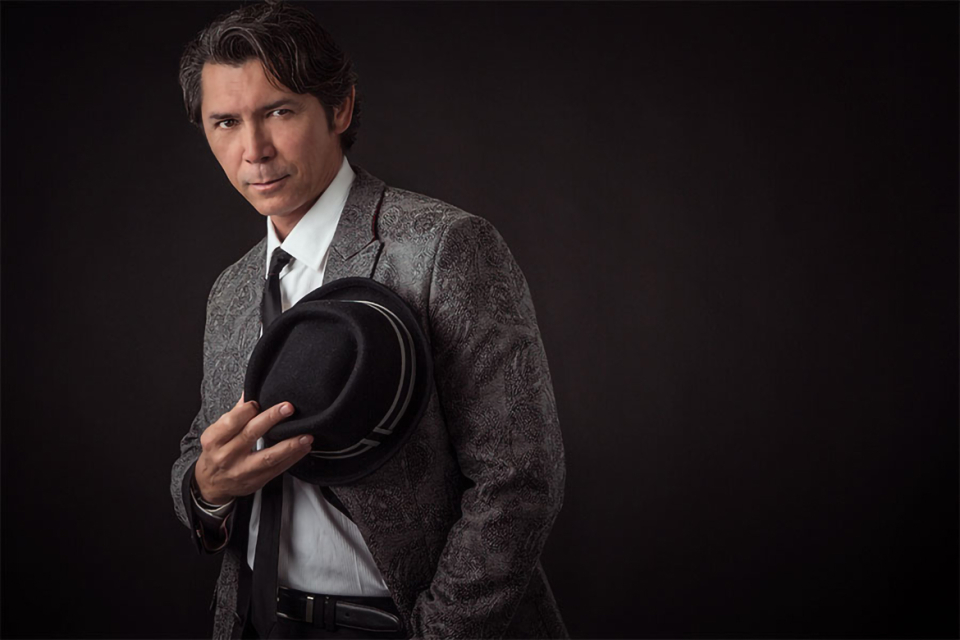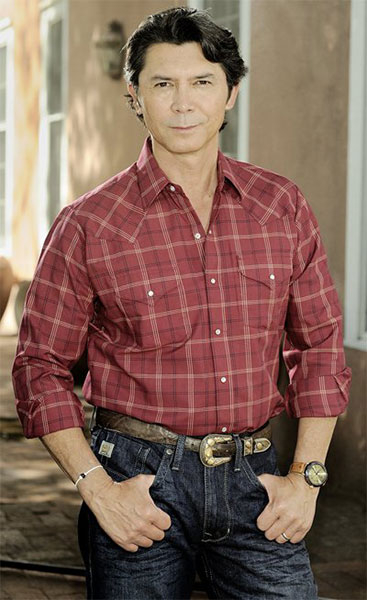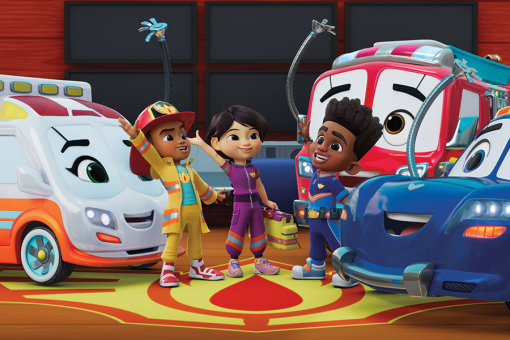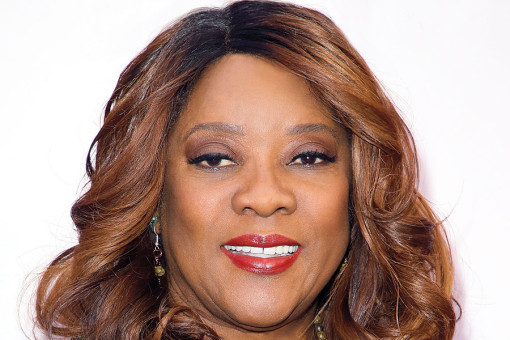From the moment he burst onto the scene with La Bamba in 1987, Lou Diamond Phillips has been wowing audiences.
Recently the multi-hyphenate entertainer added a new credit to his resumé—Emmy nominee.
Phillips received his first Emmy nod in the brand new category of Best Short Form Actor for The Crossroads of History. In the hilarious and searing satire, Phillips plays a tribal chief who is blissfully oblivious to Christopher Columbus’ true intentions when the explorer invades Hispaniola.
We recently chatted with Phillips about his varied career which currently includes returning as Henry Standing Bear for a fifth season of Longmire on September 23 and voicing a villainous cartoon character on the new Disney Channel series Elena of Avalor.
Congratulations on your first Emmy nomination!
Thank you. Not only am I grateful for it but it was so totally unexpected especially considering that it’s a brand new category and it’s comedy. It is not what I would have predicted if someone said, ‘Okay sometime in the near future you’re going to get nominated for an Emmy. What’s it going to be for?’ I would have thought Longmire, a TV movie, something along those lines.
But no here we go comedy shorts. But I’ll take it. I very very gratefully receive it.
How did the part come about for you?
You can sum up my career by the UPS motto “what can brown do for you?” There’s a limited pool of people when it comes to playing tribal chieftains. I had done a similar role for Another Period last year and I think [Crossroads of History creator] Elizabeth Shapiro may have known some of those people. My name was on the list and they reached out.
But it’s so true. I don’t think of you as doing comedy.
Comedy comes to me so rarely that often I’ll jump on it sight unseen but this script was very very funny and I love the fact that the whole set up of the Crossroads of History is a satirical but I think very poignant look at these moments in history where the course of mankind could have been changed.
I think that comes with a great deal of resonance and a great deal of depth even though we’re approaching it in a very light hearted manner.
Why do you think you don’t get more comedic parts?
People see the mainstream work. They see the biggest things that you do and it’s easy to assume that’s all you do. I remember when it was announced that I was going to do The King and I on Broadway there was sort of this huge outcry. ‘He’s this Hollywood actor. What is he doing stepping on stage?’
I have a degree in theater. It’s what I cut my teeth on. It’s what I do. It’s just that you don’t know that I do it so you’re prejudging me and putting me into a box.
The short definitely made me laugh but for something that’s only about 11 minutes long, it leaves a big impression and truly makes you think.
The best satire does that. It comes at you sideways. It doesn’t beat you over the head by lecturing you or being pedantic. Even though you get a lot of laughs, I think the lesson, if you will, or the message stays with you and resonates. That’s very important. That’s what history is supposed to teach us.
I think we’ve come to a point in our education where it’s not revisionist history; we are revising our perception of what history is. As they say, ‘history is written by the victors’ and finally we’re going back and reinvestigating this and going, ‘Wait a second. This was told from a certain point of view but what if we look at it from another point of view.’
It is not necessarily all smiles and sunshine. It really had real life ramifications for different cultures and different peoples.
It’s also incredibly timely.
It is ridiculously relevant. We’re talking about diversity right now. It’s a hot button topic in so many different fields not just the entertainment one. We basically see the arrogance of one culture believing they are superior to another and sadly enough that is still an ongoing debate when it comes to equality, when it comes to inclusion.
I wanted to talk to you about Elena of Avalor. You voice the debonair Victor Delgado in the new Disney animated series.
Once again that gig came to me totally out of left field. I was actually doing [Lifetime movie] The Night Stalker playing serial killer Richard Ramirez. Very hard core character study and Quyen Tran was our cinematographer. Her husband is Sam Riegel who directs Elena of Avalor.
Randomly out of the blue one day she goes, “Do you do any voice over work? My husband is directing this new thing called Elena of Avalor. You interested?”
The series got a lot of attention because Elena is Disney’s first Latina princess.
Yet again something that’s a lot of fun for me actually has some great resonance in the real world. I’m the father of four daughters and I’m very very proud of what Disney has done over the years to empower and to include young women of every different culture and ethnic community and to be a part of that yet again is something that I take very seriously and I have a lot of pride in.
Let’s talk about Longmire which is back for a fifth season September 23 on Netflix.
This is the longest running television thing I’ve ever done and it’s wonderful because it’s continuing to evolve. The shakeup of moving from A&E to Netflix and having a near death makes you appreciate what you’re doing and it was an absolute blessing in disguise because on Netflix we get an extra 20 minutes.
Because my character is not always plot driven a lot of my stuff ended up on the floor. With this move to Netflix, Henry Standing Bear was able to spread his wings, if you will, so we introduced a bunch of story lines in Season Four that will continue in Season Five. We are getting to see what makes him tick a little bit more. See different aspects of his character. He’s got a lot of things going on.
What will we see for him this season?
He takes some very interesting detours in Season Five. The biggest thing is that he’s continuing to evolve. He started as one thing hugely inspired by the books written by Craig Allen Johnson who has become a dear friend of mine. But Henry has evolved and gone in place the books would never imagine.
Although I would say the seed of what was happening to Henry in the series are there in the books. The vigilantism that he sort of takes on can be traced back to Another Man’s Moccasins where Henry was a black ops soldier during the Vietnam War. There are touchstones there.
You began your career over 30 years ago. How far do you think diversity has come?
It sort of depends on who you talk to on what day of the week. Some people would say there are huge changes happening, others would say that it’s incremental. I think the truth falls in the middle like it often does. I think there is certainly much more opportunity than I had when we made La Bamba back in 1986/1987.
I think that there are more opportunities for performers and entertainers of color. The Elena of Avalor cast is largely Latina. I just did The 33 with an international cast from around the world. I think there’s more opportunity for us out there.
We have to keep fighting to get that representation. It’s something that I’m constantly doing on Longmire as well, representing the Native American community, making sure we get the real deal and because of that it’s fantastic. We not only had Graham Greene but also Julia Jones and Irene Bedard. So we are seeing ethnic communities being represented on the screen.
Obviously there’s a lot more that we can do but hopefully the lines are being blurred where you don’t just have to play the Latino, or the African American or the Asian American you can play American. That you can be a doctor or a lawyer or a cop or a mayor or President or whatever and there’s not a second thought about color blind casting. That is where we need to go and where we need to get.
What do you attribute your long and varied career to?
As a performer you have to constantly push that envelope and not redefine yourself but reintroduce yourself to a community that thinks they know the extent of your ability. If you’ve got range then you continually have to show it. People tend to categorize you as to the last thing that you did. That even falls into the good guy/bad guy category.
You have to consciously shake it up and change up the perception of yourself which means you have to work a lot harder. There are certain people who fall into a niche and good for them they continue to get those role and do very very well by them and they become a brand as it were.
For those of us who consider ourselves to be character actors, you’ve got to go into the room and you’ve got to win the day and prove a point that often times you take for granted.
I remember back in the early 90s where, quite honestly we got complacent instead of being out there beating the bushes going, ‘What’s out there? What’s interesting? What’s new? What’s challenging?’ I think I made the mistake of thinking that I earned tenure and certain things were just going to come to me.
I’d see roles on the screen think, ‘Why didn’t I see that? Why wasn’t I up for that?’ I decided, ‘That’s it. Done.’ No matter what it is. No matter what the money is. No matter if they say you’re not right for that, we have to keep asking. We have to keep knocking on doors. As a result I think my career has become richer for it.
Never stop pushing yourself. You can lose your edge too. Your roles can become flabby. They can become complacent and lazy. I’m not letting that happen. No matter what I’m doing whether it’s a 12 minute short, whether it’s an independent film or a bigger budget film that has so much support. I’m going to bring my A game.












